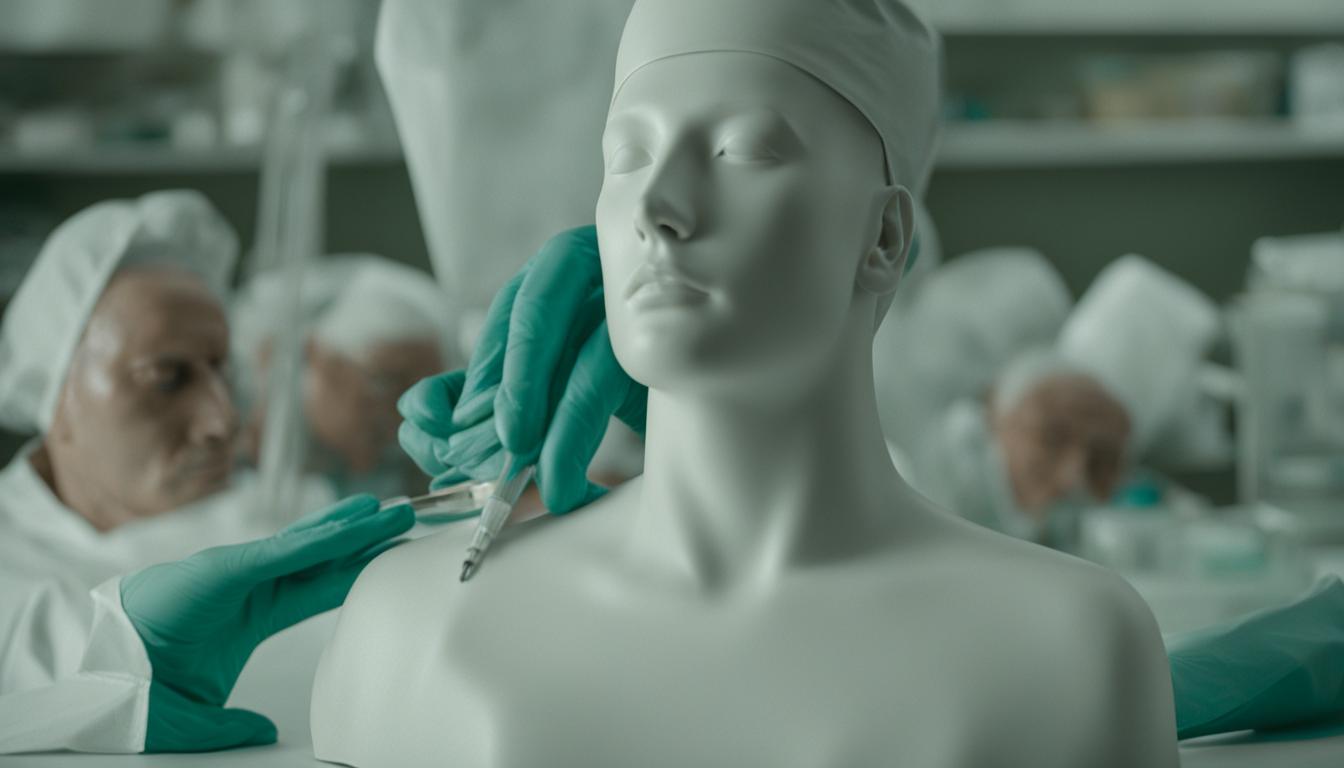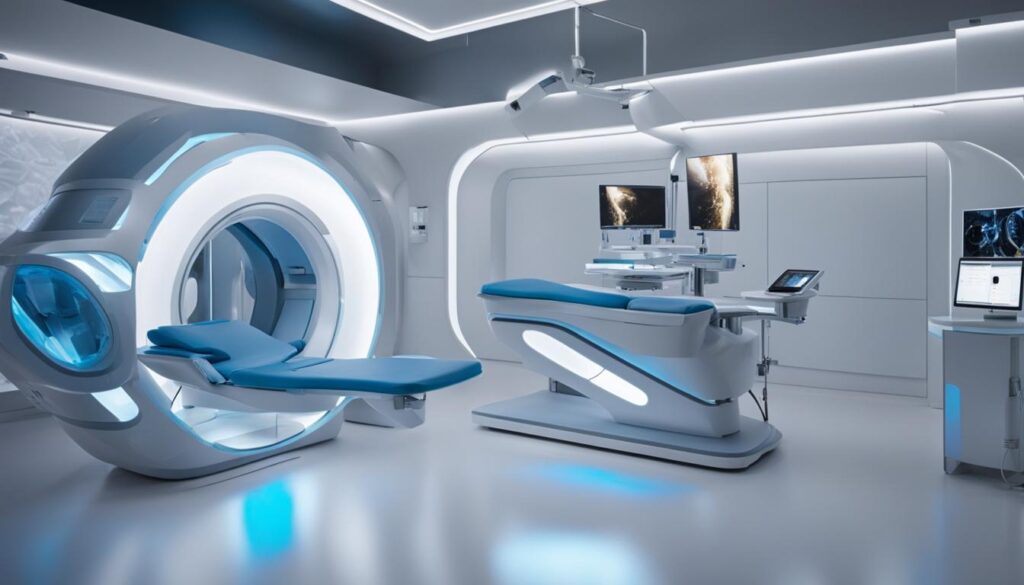Unraveling the Mystery: Why is it Called Plastic Surgery?
Greetings! Welcome to my article on the fascinating world of plastic surgery. Have you ever wondered why it’s called “plastic” surgery? In this section, we will explore the origins and meaning behind this unique name.
Plastic surgery gets its name from the Greek word “plastikos,” which means “to mold or shape.” The term was first coined by German surgeon Karl Ferdinand von Graefe in the early 19th century. He used the term “plastische Chirurgie” to describe the surgical techniques used to reconstruct facial defects.
Over time, the term expanded to include a broader range of cosmetic procedures aimed at improving and reshaping the body. Today, plastic surgery encompasses a wide variety of surgical and non-surgical procedures, all with the common goal of enhancing or altering physical appearance.
Key Takeaways:
- The term “plastic surgery” comes from the Greek word “plastikos,” meaning “to mold or shape.”
- It was first used by German surgeon Karl Ferdinand von Graefe in the early 19th century.
- Originally focused on reconstructive surgery, it later expanded to include cosmetic procedures.
- Plastic surgery encompasses a wide range of surgical and non-surgical treatments to enhance or alter physical appearance.
- The field has evolved significantly over time, with continued advancements in techniques and technology.
The Origins of Plastic Surgery Terminology
The term “plastic surgery” might seem misleading, as it is often associated with the use of plastics or synthetic materials. However, the word “plastic” in this context does not refer to the material but rather to the Greek word “plastikos,” which means “to mold or shape.” Plastic surgery involves manipulating and reshaping tissues, whether it’s through surgical procedures or non-invasive treatments. The term accurately captures the essence of the field, which is focused on sculpting and reshaping the human body.
To understand the origins of plastic surgery terminology, we must look back to the early 19th century when German surgeon Karl Ferdinand von Graefe first coined the term “plastische Chirurgie.” He used this term to describe the surgical techniques used to reconstruct facial defects. This term later expanded to include a broader range of cosmetic procedures aimed at improving and reshaping the body.
“Plastic surgery, in its truest sense, has nothing to do with plastic materials. It is a surgical specialty dedicated to restoring form and function to the human body, derived from the Greek word ‘plastikos,’ meaning ‘to mold or shape.'”
The terminology of plastic surgery accurately reflects the core principles of the field, which involve the art and science of reshaping the body for both functional and aesthetic purposes. It represents the transformative nature of these procedures, where skilled surgeons mold and shape tissues to enhance or restore patients’ physical appearance.
The Historical Evolution of Plastic Surgery
The practice of plastic surgery has a rich and fascinating history that can be traced back thousands of years. From ancient civilizations to modern times, the field has undergone significant developments and advancements. Today, plastic surgery encompasses a wide range of procedures aimed at improving and reshaping the human body. Let’s delve into the historical evolution of plastic surgery to understand how it has become the field it is today.
Ancient Beginnings
Plastic surgery has its roots in ancient civilizations such as India, Egypt, and the Roman Empire. These civilizations pioneered reconstructive procedures to correct physical deformities and injuries. Ancient Indian texts describe techniques for reconstructing noses, ears, and other body parts using flaps of skin.
In Egypt, mummified remains have revealed evidence of early reconstructive procedures, including cosmetic facial surgery and the use of prosthetics. The Roman Empire also saw advancements in the field, with skilled physicians using techniques like skin grafting and scar revision.
The Emergence of Modern Plastic Surgery
While the practice of plastic surgery dates back centuries, it was not until the late 19th and early 20th centuries that it truly emerged as a medical specialty. Pioneers like Sir Harold Gillies and Sir Archibald McIndoe made substantial contributions to the field during World War I and II.
Gillies, often referred to as the “father of modern plastic surgery,” developed innovative techniques for reconstructing facial injuries sustained by soldiers in the war. His work laid the foundation for the field of facial and reconstructive surgery.
McIndoe further advanced the field by focusing on the psychological and social well-being of his patients. He pioneered techniques for the treatment and rehabilitation of burn victims, emphasizing the importance of a holistic approach to patient care.
Advancements in the Modern Era
Since its formalization as a medical specialty, plastic surgery has continued to evolve and advance. Technological advancements, such as the advent of anesthesia, improved surgical tools, and better post-operative care, have made procedures safer and more precise.
Plastic surgery techniques have also expanded to include minimally invasive procedures, endoscopic surgery, and the use of tissue flaps. These advancements have revolutionized reconstructive procedures, allowing for more precise outcomes and shorter recovery times.
Furthermore, the integration of digital imaging and computer-assisted technologies has transformed both cosmetic and reconstructive surgeries. These tools enable surgeons to create more accurate treatment plans and help patients visualize potential outcomes.
In summary, the historical evolution of plastic surgery showcases its long and diverse history. From ancient civilizations to modern times, the field has undergone significant advancements in reconstructive and cosmetic procedures. Pioneers in the field have paved the way for innovations and improvements, shaping plastic surgery into the specialized medical field it is today.
| Key Milestones in Plastic Surgery History | Year |
|---|---|
| Ancient India | 6th century BCE |
| Ancient Egypt | 3000 BCE |
| Ancient Rome | 1st century BCE |
| Sir Harold Gillies’ contributions to facial reconstruction | World War I era (1914-1918) |
| Sir Archibald McIndoe’s advancements in burn treatment | World War II era (1939-1945) |
| Introduction of digital imaging and computer-assisted technologies | 20th century |
The Scope of Plastic Surgery
Plastic surgery encompasses a wide range of procedures, each serving a unique purpose. From cosmetic enhancements to reconstructive surgeries, the field of plastic surgery offers various options to address different needs and concerns.
Cosmetic Surgery Procedures
Cosmetic surgery focuses on improving aesthetic appearance and enhancing one’s physical features. These procedures are elective and generally aim to boost self-confidence and satisfaction with one’s appearance.
Common cosmetic surgery procedures include:
- Breast augmentation: Enhancing the size and shape of the breasts through the use of implants or fat transfer.
- Rhinoplasty: Reshaping the nose to achieve an improved aesthetic or correct structural abnormalities.
- Liposuction: Removing excess fat deposits to contour and sculpt the body.
- Facelift: Reducing the signs of aging by tightening and lifting the facial skin and muscles.
Reconstructive Surgery Procedures
Reconstructive surgery aims to restore function and improve quality of life for individuals with congenital deformities, injuries, or medical conditions. These procedures are often medically necessary and can have a significant impact on a patient’s physical and emotional well-being.
Common reconstructive surgery procedures include:
- Breast reconstruction: Restoring the shape and appearance of the breast following mastectomy or injury.
- Cleft palate repair: Correcting a congenital condition where there is a gap or split in the roof of the mouth.
- Scar revision: Improving the appearance of scars through surgical techniques.
- Burn reconstruction: Restoring functionality and aesthetic appearance to areas affected by burns.
By offering a wide range of procedures, plastic surgery caters to the diverse needs and goals of individuals seeking to enhance their appearance or restore their physical well-being.
The Evolution of Plastic Surgery Techniques
Advancements in medical technology and surgical practices have led to significant developments in plastic surgery techniques. These advancements have made procedures safer, more precise, and less invasive, resulting in improved outcomes for patients. Here are some key advancements in modern plastic surgery techniques:
Minimally Invasive Surgery
Minimally invasive surgery has revolutionized the field of plastic surgery. It involves making small incisions and using specialized tools and techniques to perform procedures with minimal damage to surrounding tissues. This approach results in faster recovery times, reduced scarring, and decreased risk of complications. Common minimally invasive procedures include Botox injections, dermal fillers, and laser treatments.
Endoscopic Surgery
Endoscopic surgery involves the use of an endoscope, a long, flexible tube with a camera and light source, to perform surgical procedures. This technique allows surgeons to visualize the internal structures of the body without the need for large incisions. Endoscopic surgery is commonly used in facial rejuvenation procedures, such as brow lifts and facelifts, as well as in breast augmentation and abdominal surgeries.
Tissue Flaps
Tissue flaps are commonly used in reconstructive plastic surgery to restore form and function to damaged or missing body parts. This technique involves taking a section of tissue from one part of the body, along with its blood supply, and transferring it to the area in need of reconstruction. Tissue flaps can be used to reconstruct breasts, repair complex wounds, and restore facial features.
Digital Imaging and Computer-Assisted Technologies
The integration of digital imaging and computer-assisted technologies has had a profound impact on the planning and execution of plastic surgery procedures. Surgeons now have access to advanced imaging software that allows them to create 3D models of a patient’s anatomy, simulate surgical outcomes, and plan precise surgical incisions. This technology enables surgeons to achieve more accurate results and enhances patient satisfaction.
These advancements in plastic surgery techniques have transformed the field, offering patients safer procedures, faster recovery times, and more natural-looking results. As technology continues to evolve, we can expect further innovations that will further improve the practice of plastic surgery.
The Impact of Plastic Surgery on Society
Plastic surgery has had a profound impact on society, shaping societal views on beauty and self-image. While opinions on plastic surgery vary, it undeniably influences cultural norms and ideals of attractiveness. Some argue that plastic surgery perpetuates unrealistic beauty standards and can contribute to body dysmorphia, while others see it as a way for individuals to enhance their self-esteem and express their personal identity.
Plastic surgery has the potential to positively affect a person’s self-esteem and confidence. For individuals who undergo reconstructive procedures, such as breast reconstruction after a mastectomy, plastic surgery can help restore a sense of wholeness and improve their quality of life. It provides an opportunity for individuals to regain their physical appearance, which can significantly impact their self-image and overall well-being.
However, it is essential to recognize that plastic surgery is a personal choice and should not be viewed as a definitive solution for everyone. It is crucial to approach plastic surgery with realistic expectations and understand that physical changes may not necessarily lead to an improvement in mental health or self-esteem. Prioritizing mental and emotional well-being is just as important as the physical transformation that plastic surgery can offer.
As societal attitudes continue to evolve, it is important to engage in conversations surrounding plastic surgery and its impact on self-esteem. By promoting a healthy and inclusive understanding of beauty, we can ensure that individuals make informed decisions about their bodies and feel empowered to embrace their unique qualities, whether they choose to pursue plastic surgery or not.
The Ethical Considerations of Plastic Surgery
Plastic surgery raises several ethical considerations that must be carefully addressed to ensure patient well-being and safety. One of the primary ethical issues in plastic surgery is patient consent. Surgeons must ensure that patients fully understand the risks, benefits, and potential outcomes of the procedures they are considering. Informed consent involves providing patients with detailed information about the procedure, including potential risks, complications, and expected results. It is crucial for surgeons to take the time to answer any questions patients may have and to obtain their explicit consent before proceeding with any surgical intervention.
Another ethical consideration in plastic surgery is patient autonomy. Patients should have the freedom to make their own decisions regarding their bodies, but it is essential to ensure that their decisions are well-informed. Surgeons should provide patients with all relevant information and offer realistic expectations about the outcomes of the procedure. Additionally, they should assess the psychosocial factors that may influence a patient’s decision to undergo surgery, ensuring that the patient’s motivations are appropriate and that they have a genuine desire for the procedure.
“Informed consent involves providing patients with detailed information about the procedure, including potential risks, complications, and expected results.”
Furthermore, the ethical use of technology is an important consideration in plastic surgery. While technological advancements have revolutionized the field and improved patient outcomes, it is vital to ensure that technology is used responsibly and ethically. Surgeons should stay updated with the latest advancements in the field to provide their patients with the highest level of care, while also prioritizing patient safety, privacy, and well-being.
Lastly, avoiding unnecessary procedures is a critical ethical responsibility in plastic surgery. Surgeons should carefully assess each patient’s unique situation and only recommend procedures that are truly beneficial and necessary. They should prioritize the overall health and well-being of their patients, providing conservative and responsible treatment plans that align with the individual’s goals and expectations.
The Ethical Considerations of Plastic Surgery
| Ethical Issues | Description |
|---|---|
| Patient Consent | Surgeons must ensure patients understand the risks, benefits, and potential outcomes of procedures and obtain their explicit consent. |
| Patient Autonomy | Patients should have the freedom to make their own decisions regarding their bodies, but surgeons must ensure their decisions are well-informed and motivations are appropriate. |
| Ethical Use of Technology | Surgeons should use technology responsibly, prioritizing patient safety, privacy, and well-being. |
| Avoiding Unnecessary Procedures | Surgeons should carefully assess each patient’s situation and only recommend procedures that are truly beneficial and necessary. |
The Future of Plastic Surgery
As technology continues to advance, the field of plastic surgery is poised for exciting developments and innovations. The future holds the promise of new trends and advancements in cosmetic procedures, revolutionizing the way we enhance and reshape our bodies.
One notable trend on the horizon is the use of regenerative medicine and stem cell therapy in reconstructive procedures. These cutting-edge techniques have the potential to accelerate the body’s natural healing process and promote tissue regeneration, leading to improved outcomes and reduced recovery time.
Advancements in cosmetic procedures are also on the horizon. Non-invasive treatments such as injectables, lasers, and energy-based devices are gaining popularity, offering patients alternatives to traditional surgical procedures. These innovative techniques have the potential to deliver remarkable results with minimal downtime.
A shift toward a more personalized approach to patient care is another trend to watch. Plastic surgeons are increasingly tailoring treatment plans to meet the unique needs and expectations of each individual. This personalized approach takes into account factors such as anatomy, lifestyle, and desired outcomes, ensuring a more satisfactory and customized experience for patients.
| Trend | Description |
|---|---|
| Regenerative Medicine | Utilizing stem cells and regenerative techniques to enhance tissue healing and regeneration. |
| Non-Invasive Procedures | Advancements in injectables, lasers, and energy-based devices for cosmetic enhancements with minimal downtime. |
| Personalized Treatment Plans | Tailoring procedures to meet individual needs and expectations for a more customized patient experience. |
The future of plastic surgery is bright, with a focus on continuous improvement and innovation. It is an exciting time for both patients and practitioners, as advancements in technology and techniques pave the way for enhanced outcomes and patient satisfaction.
The Importance of Choosing a Qualified Plastic Surgeon
When it comes to undergoing plastic surgery, selecting a qualified and experienced plastic surgeon is of utmost importance. The skill and expertise of the surgeon can significantly impact the success and safety of the procedure, as well as the overall satisfaction of the patient.
One crucial factor to consider when choosing a plastic surgeon is their board certification. Board certification ensures that the surgeon has undergone rigorous training and has met the highest standards of education, ethics, and patient care in their specialty. In the field of plastic surgery, certification from reputable organizations such as the American Board of Plastic Surgery (ABPS) is a strong indication of the surgeon’s expertise and competence.
Researching a plastic surgeon’s credentials is essential. You can start by checking their qualifications, experience, and any additional certifications they may hold. Reading patient reviews and testimonials can give you insights into the surgeon’s reputation and the experiences of previous patients. It is also recommended to schedule consultations with potential surgeons to discuss your goals, expectations, and any concerns you may have. This allows you to gauge their communication and interpersonal skills, as well as their ability to understand and address your specific needs.
Benefits of Choosing a Qualified Plastic Surgeon
- Expertise and Technical Skill: A qualified plastic surgeon possesses extensive knowledge and experience in performing various surgical techniques. Their expertise allows them to navigate potential complications and deliver optimal results.
- Safe and Effective Procedures: Board-certified plastic surgeons are committed to maintaining the highest standards of safety and ethics in their practice. They follow strict protocols and guidelines to ensure that procedures are performed with precision and minimize the risk of complications.
- Individualized Treatment Plans: Qualified plastic surgeons take a personalized approach to patient care. They assess each patient’s unique needs and goals, considering factors such as anatomy, lifestyle, and medical history. This allows for the development of customized treatment plans that yield the best possible outcomes.
- Enhanced Patient Experience: Choosing a qualified plastic surgeon not only ensures the technical skills necessary for a successful surgery but also contributes to an overall positive patient experience. From the initial consultation to post-operative care, a reputable surgeon prioritizes patient comfort, support, and satisfaction.
Remember, plastic surgery is a personal choice that can have a significant impact on your physical appearance and emotional well-being. By selecting a qualified plastic surgeon with board certification, you can increase the likelihood of achieving your desired results and ensure a safe and positive surgical journey.
The Psychological Effects of Plastic Surgery
| The Psychological Effects of Plastic Surgery |
|---|
| Plastic surgery can have a profound impact on individuals’ psychological well-being, influencing their body image, self-esteem, and overall mental health. For many people, undergoing plastic surgery is a deeply personal decision rooted in a desire to enhance or alter their physical appearance. The transformation that comes with plastic surgery can lead to a boost in self-confidence and body satisfaction, resulting in improved mental well-being.
Research has shown that individuals who undergo plastic surgery often experience enhanced self-esteem and improved quality of life. For example, a study published in the journal “Plastic and Reconstructive Surgery” found that breast augmentation surgery was associated with significant improvements in self-esteem and body image. Similarly, research has shown that procedures such as rhinoplasty and facelifts can lead to increased self-confidence and improved social functioning. |
However, it is important to note that plastic surgery is not a guaranteed solution to psychological issues or low self-esteem. While many individuals experience positive psychological effects, it is possible for others to develop unrealistic expectations or experience dissatisfaction with the outcomes of their procedures. It is crucial for individuals considering plastic surgery to have realistic expectations and to prioritize their psychological well-being throughout the process.
“Plastic surgery should never be seen as a quick fix for deeper psychological issues. It is important for individuals to undergo thorough psychological assessments before undergoing surgery to ensure that they are mentally and emotionally prepared for the potential outcomes and challenges that may arise.” – Dr. Emily Johnson
In addition to pre-operative assessments, post-operative counseling can also play a crucial role in supporting patients’ mental health. This may involve addressing any unrealistic expectations, managing potential body image concerns, and providing emotional support during the recovery process. Plastic surgeons often work alongside mental health professionals to ensure a holistic approach to patient care and to promote overall well-being.
Key Points:
- Plastic surgery can have a positive impact on self-esteem and body satisfaction, improving individuals’ mental well-being.
- Research has shown that procedures like breast augmentation, rhinoplasty, and facelifts can enhance self-confidence and social functioning.
- It is important for individuals considering plastic surgery to have realistic expectations and prioritize their psychological well-being throughout the process.
- Pre-operative assessments and post-operative counseling play a crucial role in supporting patients’ mental health.
Conclusion
After delving into the world of plastic surgery, it becomes clear that the name itself holds historical significance. Derived from the Greek word “plastikos,” meaning “to mold or shape,” plastic surgery has a rich and evolving past. From its origins in reconstructive techniques to the modern-day cosmetic and non-surgical procedures, plastic surgery continues to shape the way we perceive beauty and restore function to those in need.
With its wide scope, plastic surgery offers a range of procedures catering to both cosmetic and reconstructive needs. From breast augmentation to scar revision, each procedure aims to enhance physical appearance or improve quality of life. Advancements in technology and surgical techniques have revolutionized the field, making procedures safer, more precise, and offering alternatives to traditional surgery.
However, ethical considerations should not be overlooked. Patient consent, realistic expectations, and the responsible use of technology are crucial aspects of plastic surgery. It is also essential to prioritize mental and emotional well-being throughout the process, ensuring a positive surgical experience and long-term satisfaction.
Looking to the future, plastic surgery holds exciting possibilities. As technology continues to advance, regenerative medicine, 3D printing, and non-invasive treatments may play a larger role in reconstructive and cosmetic procedures. Additionally, a personalized approach to patient care, emphasizing individualized treatment plans and holistic well-being, will shape the future of plastic surgery.
FAQ
Why is it called plastic surgery?
The term “plastic surgery” comes from the Greek word “plastikos,” which means “to mold or shape.” It refers to the surgical techniques used to reconstruct facial defects and has since expanded to include a broader range of cosmetic procedures.
What is the meaning behind the term “plastic” in plastic surgery?
The term “plastic” in plastic surgery does not refer to the material but rather to the Greek word “plastikos,” which means “to mold or shape.” It accurately captures the essence of the field, which involves manipulating and reshaping tissues to enhance or alter physical appearance.
How far back does the practice of plastic surgery go?
Evidence of reconstructive procedures can be traced back thousands of years, with ancient civilizations like India, Egypt, and the Roman Empire practicing techniques to reconstruct and improve physical appearance. However, the formalization of plastic surgery as a medical specialty is relatively recent.
What is the difference between cosmetic and reconstructive surgery?
Cosmetic surgery focuses on enhancing aesthetic appearance, while reconstructive surgery aims to restore function and improve the quality of life for individuals with congenital deformities, injuries, or conditions such as breast cancer.
How have plastic surgery techniques evolved over time?
Advancements in medical technology and surgical practices have greatly improved plastic surgery techniques. Anesthesia, surgical tools, and post-operative care have all become safer and more precise. Minimally invasive surgery, endoscopic surgery, and the use of digital imaging have revolutionized both cosmetic and reconstructive procedures.
What impact does plastic surgery have on society?
Plastic surgery has influenced cultural norms and shaped perceptions of beauty. While some argue that it promotes unrealistic beauty standards, others view it as a means of empowerment and self-expression. Plastic surgery can have positive effects on self-esteem and confidence, particularly for individuals undergoing reconstructive procedures.
What ethical considerations are involved in plastic surgery?
Ethical concerns in plastic surgery include ensuring patient autonomy and informed consent. Surgeons must provide patients with a thorough understanding of the risks, benefits, and potential outcomes. Additionally, the ethical use of technology, patient privacy, and avoiding unnecessary procedures are important considerations.
What does the future hold for plastic surgery?
The future of plastic surgery is driven by advancements in technology and a personalized approach to patient care. Trends include the use of regenerative medicine, stem cells, and 3D printing in reconstructive procedures. Non-invasive treatments and a focus on individualized treatment plans are also shaping the field.
How do I choose a qualified plastic surgeon?
It is crucial to research and choose a board-certified plastic surgeon with certifications from reputable organizations such as the American Board of Plastic Surgery (ABPS). Look for a surgeon with experience, positive patient reviews, and schedule consultations to discuss expectations.
What psychological effects can plastic surgery have?
Plastic surgery can influence body image, self-esteem, and overall well-being. While some individuals experience increased self-confidence and body satisfaction, others may develop unrealistic expectations or experience dissatisfaction. Pre-operative assessments and post-operative counseling can play a crucial role in supporting patients’ mental health.








